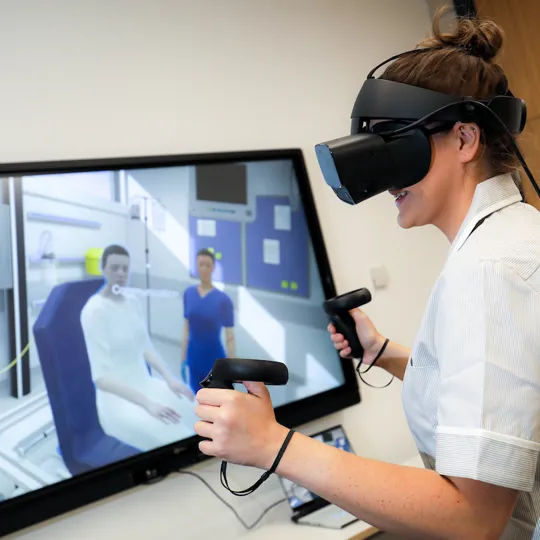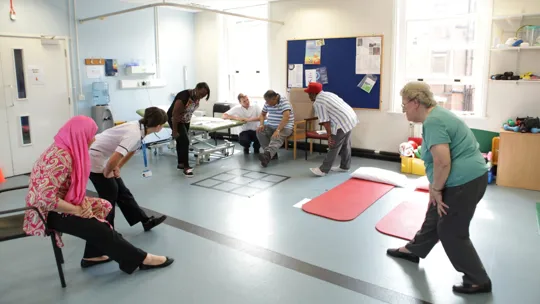May 2025
Blog | Nursing Associate vs Registered Nurse: choosing the right path for you
- About us
- News and Insights
- Blog | Nursing Associate vs Registered Nurse: choosing the right path for you

Read time: approx 1 mins
Not sure which nursing course is for you? This blog will help you to find out which role fits your goals, lifestyle and future plans.
If you’re thinking about starting a career in nursing, or moving from another sector, you may be wondering which is the best role for you. Registered Nurse and Nursing Associate positions are amongst the most common in the UK, and while both play vital roles in patient care, the paths to each are different.
In this guide, we’ll help you find the nursing role that best fits your goals, lifestyle, and future plans by exploring the key differences between Nursing Associates and Registered Nurses. We’ll look at the responsibilities, qualifications, and soft skills that make a great nurse – and why this rewarding role sits at the heart of our healthcare system.

What’s the difference between a Nursing Associate and a Registered Nurse?
Nursing Associates and Registered Nurses both work with patients to support their care and wellbeing, but their responsibilities, training routes, and scope of practice are different.
A Registered Nurse assesses, plans and leads on patient care, and holds a greater degree of responsibility for clinical decision-making. It typically takes 3 years in a full-time degree to become a Registered Nurse, and there is a chance to specialise in areas such as adult nursing, mental health, or children’s nursing.
A Nursing Associate supports Registered Nurses in care delivery, including monitoring vital signs, personal care, and supporting treatment plans. They work across a wide range of healthcare settings including hospitals, GPs, and the community. Completing the course usually takes two years of full-time training.
The two roles complement each other – one isn’t “better” than the other; both are essential for delivering safe and effective care.

Education and training
To become a nursing associate, you typically complete a foundation degree such as the Nursing Associate FdSc offered here at University College Birmingham, which takes two years full-time and combines academic study with practice-based learning in various healthcare settings.
Some students find that training through an apprenticeship is the best route for them, meaning you can earn while you learn in an NHS role.
To become a Registered Nurse, you’ll usually need to complete a three-year full-time bachelor’s degree in nursing. This includes more in-depth academic study, as well as training in clinical leadership and decision-making.
Registered Nurses don’t train as generalists – they specialise from the start in a specific field of practice, such as adult, children’s, or mental health nursing.

Career progression and flexibility
Both roles offer strong job prospects within the NHS and wider healthcare sector. Nursing Associates are trained to work across a variety of settings – from GP surgeries and hospital wards to mental health and community services – giving them broad experience and exposure to different areas of care.
Many Nursing Associates enjoy the variety this brings, along with the opportunity to build close relationships with patients through hands-on, person-centred care.
Some Nursing Associates choose to stay in the role and develop their skills further, while others decide to build on their experience and train as Registered Nurses. This “top-up” route is well established and allows you to progress without starting from scratch.
If you already know you want to lead clinical care or work in a specialist area – such as neonatal, A&E or oncology nursing – becoming a Registered Nurse from the outset may be the more direct path. But if you’re looking for a respected entry point into nursing, with the flexibility to explore different fields and grow your career over time, the nursing associate route could be a great fit.

Is nursing a good career for me?
If you’re changing careers or looking for a meaningful next step, nursing can offer a stable, people-focused, and incredibly rewarding path.
Many of our nursing graduates have found that to be the case, but it’s also a demanding profession that requires emotional resilience, teamwork, and problem-solving. Ask yourself:
- Do I want to work directly with people and make a difference in their day-to-day lives?
- Am I comfortable working in fast-paced environments where every day is different?
- Would I prefer to train quickly and enter the workforce sooner, or take more time and specialise?
There’s no one-size-fits-all route – and both nursing associates and registered nurses are critical to delivering excellent patient care.

Making your choice
Healthcare needs compassionate, dedicated people – and the first step is exploring your options.
As we’ve seen, choosing between the two roles depends on your current situation, long-term goals, and how quickly you want to start working in healthcare.
If you’re eager to get started, want real-world experience, and are open to developing your career over time, becoming a Nursing Associate could be the ideal first step. If you’re ready to dive deeper into clinical care and know you want a leadership or specialist role, starting out as a Registered Nurse may make more sense for you.
At University College Birmingham we’re proud to support the next generation of healthcare professionals. That’s why we offer a £5,000 Cost-of-Living payment to eligible foundation and undergraduate students – helping you stay focused on your training and the journey ahead. Whichever route you take, you’ll be entering a career where your work truly makes a difference.
Find out more about our Nursing Associate FdSc
Read about our Adult Nursing BSc (Hons) degree
Discover our free £5000 Cost-of-Living Allowance
Check out our latest news stories

College of Food grad gains prestigious Michelin star for Lichfield restaurant
An acclaimed local restaurant run by a University College Birmingham graduate has been honoured with its first Mi…
Read more

College football team tastes victory in first Midlands tournament
A team of further education students from University College Birmingham have brought home the trophy in the Midlands' first C…
Read more
Principal congratulates college students at recognition lunch
Six students were invited to the College’s first-ever Student Recognition Lunch at our award-winning restaurant on campus as part…
Read more
New partnership expands access of award-winning joint pain programme
New partnership gives opportunities for students, as well as providing accredited training.
Read more
University leads the charge towards the UK's battery manufacturing ambitions
Battery Manufacturing Skills Pathway first graduates take their skills and knowledge back into the workplace.
Read more